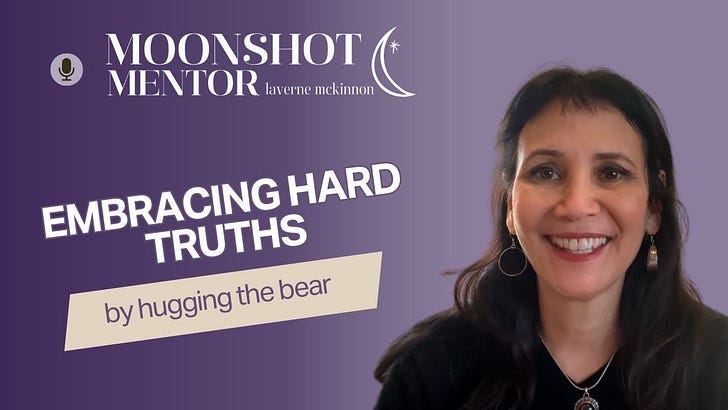Please don’t judge me for what I’m about to say about my client Chris - that’s not their real name, but what I’m calling them to protect their identity because I value confidentiality. At the same time, Chris has given me permission to share their story and knows that they were making me crazy! They were making themselves crazy too!
Spoiler alert: We laugh about it now.
Okay, so Chris is a great client - ambitious, driven, ready and willing to do the work. They came to me because they wanted leadership coaching since they had recently been promoted and wanted to make sure they could nail their new responsibilities as a manager of a team of three. Chris had a clear vision for having a small and effective department that not only worked well together, but also hit their KPIs’ (key performance indicators) out of the ballpark.
And then, out of the blue, Chris was laid off in a massive, unexpected restructuring of the company. They were barely out of the gate with the new gig and were completely blindsided. We took some time to grieve the loss (learn about dis-enfrachised grief here) and Chris truly saw that their unemployment was not a reflection of their work. Over a third of the company was let go so it was clear it was an economic decision — and it sucked.
Chris had started out as an assistant in the company and rose steadily through the ranks to become a Vice-President at the time of the down-sizing. We spent time updating their resume and getting clear on their life purpose and what was important with the next role.
Armed and ready, Chris became paralyzed. And this is what made both of us totally nuts! They would find these great opportunities that perfectly aligned with their talents and experience and wouldn’t apply! They would go around in circles analyzing every single job requirement and unless they could confidently check off every single box, they refused to submit.
Chris was suffering from a form of Imposter Syndrome called being the “Expert.” And I don’t say suffer lightly. Chris was in a lot of emotional turmoil over feeling like they were not enough. They considered going back to school to get an MBA or an MFA, or maybe even a SCRUM certification.
Dr. Valerie Young from the Imposter Syndrome Institute describes the Expert as “someone who measures their competence based on what and how much they know or can do. Believing they will never know enough, they fear being exposed as inexperienced or un-knowledgeable.“
In part one of this five part series, I wrote about how people who experience Imposter Syndrome typically respond in one of three ways:
Procrastination
Over-preparation
Pre-crastination
Chris’ desire to go back to school was a form of procrastination even though they value education and professional development. We were able to figure out the distinction between listening to a “gremlin” and honoring a value by taking time to look at why Chris was studying for the GREs and researching graduate programs. When they were honest with themselves, it was because they felt incompetent and not ready to enter the job market.
Before I share what ultimately happened with Chris, I want to highlight another form of Imposter Syndrome: the Natural Genius. Dr. Young defines this form as “someone who cares about ‘how’ and ‘when’ accomplishments happen.”
Chris discovered that part of why they had excelled in their career was because they were the first to have typed up notes on the projects they were working on. Again, while there was a value of professionalism being honored, they realized that it was primarily Imposter Syndrome at play. When Chris was not able to master a skill quickly and easily - like analyzing production budgets and schedules - they became frustrated and demoralized. There was no room for a learning curve and asking for help or mentorship felt like a sign of failure (a signature response of the Soloist form of Imposterism.) The Natural Genius has to get it right the first time.
Chris had a history of doing really well without a lot of effort because they only tried things that they knew they would be good at: so looking for a job and starting a new role were big imposterism triggers.
What we worked on to arm Chris for this battle was expanding their identity:
I am experienced and I need more experiential knowledge
I am competent and there are things I can improve upon
I am intelligent and I still have things to learn
I wrote about this tool in part two of this series as well.
Bottom line: The key to battling Imposter Syndrome is to embrace humility. Recognizing and accepting one’s strengths and limitations takes great, great, great effort. However, in doing so, it creates pathways to move forward by embracing the hard truth that obstacles and challenges are a natural part of life.
Ok, so back to Chris. They were able to use their values of learning and professional development to embrace the concept of humility in a new and powerful way. Chris had conflated humility with (false) modesty. Through a heartfelt understanding and acceptance that they were not a failure or destined to be a failure because they needed more knowledge, could still improve, and learn, Chris applied for jobs. It was not an easy process and for the first time, Chris experienced being ghosted in their job search, getting really really close and not being offered the role, and being told they were both overqualified and under-qualified. Through persistence, discernment and resiliency, Chris found the right match. They’ve been in the new role for about six months and they’re still in the honeymoon period.
As a review, imposter syndrome affects people of all ages and levels of success and backgrounds. It’s a feeling of being inadequate and there’s a fear of being found out. People who experience imposter syndrome hold themselves to an unattainable standard and credit their success to luck or factors outside their own competence. The five types of imposter syndrome identified by Dr. Young are perfectionist, soloist, superhuman, expert and natural genius.
With permission from Dr. Young, here’s an infographic to clearly identify these five forms of Imposter Syndrome.
Next week, we’ll take a deeper look into tools to combat Imposter Syndrome, but for now which ones resonate for you and how do they show up in your life?

I love to support ambitious, driven people who are feeling stuck and want to regain momentum so they can hit their next big goal. Want to explore working together?
If you’re resonating with what you’re reading, please consider subscribing. What’s that mean?
🙌🏾 You’ll receive regular emails (with lots of heart and a bit of humor) that share a tool or insight from my coaching practice.
🙌🏾 Typically the blog and podcast will have a question at the end to provoke thought that supports you in your growth.
🙌🏾 Updates on offerings, free stuff, recommendations, referrals.
















Share this post